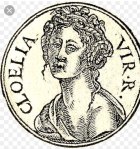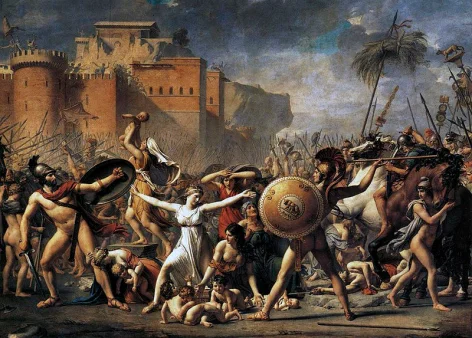An Overview of Cloelia
Cloelia was a notable woman, who lived in the early Roman period. The story of Cloelia’s bravery takes place in Rome circa 506 BCE. Cloelia was a hostage sent from the Romans to the Etruscans. The significance of her story derives from her courageous act of leading a group of young girls away from their captors and across the river Tiber. The legend of Cloelia is an outlier in the fables of most brave women, as they were often depicted as simply defending their husbands, while Cloelia was seen defying her male captors and leading a group of women to freedom. One of the reasons Cloelia’s story is significant is because “the Romans rewarded this act of courage-new in a woman with a new kind of honor, an equestrian statue.” (cited in Lefkowitz and Fant, 2016, p. 162). The Etruscans honored her and displayed this by allowing her to do what she wished with half of the remaining slaves. Her story is also notable because she is not described as having ‘Roman matronly virtue’ compared to women such as The Sabine.
Cloelia in Juxtaposition against other Roman Mytho-Historical Heroines

Cloelia’s story is an outlier among the historical and mythological records about Rome. Her story is an outlier because she is shown to possess Virtus, the Latin word referring to masculine courage as opposed to ‘Roman Matronly Virtue.’ Roman matronly virtues are the virtues ascribed to women, who remained in the domestic sphere. Part of the significance of Cloelia’s story can be elaborated on by placing her in juxtaposition against other famous female Romans. The Sabine women are an example of Romans who contrast with Cloelia regarding virtue. Dionysus discusses the importance that the Sabine women had on Rome’s mytho-historical origins. He says “the women saved both the Sabines and the Romans from war through their courage and tenacity” (cited in Brown, 1995, p. 306). The motivation behind the Sabine women’s peace proposal is due to the domestic desire to protect their fathers and husbands, which was a common trope in Roman literature. The comparison against earlier female characters in Graeco-Roman literature is a fruitful display of the character trope Cloelia exemplifies, which is the heroine free from domestic responsibilities. The apparent lack of this trope in earlier writings strengthens Cloelia’s case as the first independent heroine. The character of Dido from Virgil’s Aeneid is one which is typically considered to be a strong, independent heroine, however, upon closer examination of her character arc, it provides evidence that all of her decisions revolve around the influence of men and the domestic sphere. Dido’s rule over Carthage is related to the death of her father and husband as well as the tyrannical government of her brother in Tyre. Virgil explains Dido’s role as Queen through a dialogue Venus provides: “Dido became queen of Carthage because of the murder of her husband by her brother” (cited in Virgil, 1909, p. 87).

Cloelia in Contemporary Media
Cloelia’s influence on contemporary literature adds to her significance as a mytho-historical character. The character of Diana Prince, commonly known as Wonder Woman, provides scholars with an example of Cloelia’s influence. The role of Diana Prince mirrors her predecessor Cloelia, in both narrative and character arc. Both Characters are forced to cross a body of water to help partake in war. Cloelia crosses the river Tiber to rescue fellow hostages, and Diana crosses the Atlantic ocean to take part in World War One. The story of Cloelia further influences that of Wonder Woman by also freeing hostages as Diana does in her feature film, named after her. Both stories further relate by the lack of leading male protagonists, and the respect they garner from high ranking male military officers, with Cloelia gaining respect from the Etruscan Lars, Porsenna and Wonder Woman acquiring respect from American military spy, Steve Trevor. Steve Trevor displays his respect for wonder women in the line: “I’ll save the day, you’ll save the world” (Jenkins, Wonder Woman). This line displays the level of courage and virtue she showcased throughout her character arc to her male comrade. The Etruscan Lars “Porsenna expressly declared that her deed surpassed those of Cocles and Mucius” (Roller, 2004, p. 29). This dialogue by Porsenna provides support for the idea that men of waring countries both respected and admired Cloelia’s virtue and courage. Another example of the respect Cloelia garnered is the statue that the Romans built for her, which Livy states commemorate her bravery and Virtus. (cited in Lefkowitz and Fant, 2016, p. 162). Another point relating them to one another is that both of their names derive from Latin roots.
Conclusion
To Conclude, Livy’s Cloelia, the Hostage is an example of a Roman heroine who was not inspired to be heroic by domestic values or matronly Roman virtue, but by her own sense of morality and patriotism. Cloelia’s love for her country is demonstrated through her decision “to return all the young men” (cited in Lefkowitz and Fant, 2016, p. 162). Cloelia returns all the young men because she had already freed numerous female hostages and understood the Romans required young men to continue the war. This point demonstrates how Cloelia acts as an antithesis to the regularly used trope in Roman literature that women only performed heroics to protect their families or on behalf of them, as displayed in stories of The Sabine Women and Dido, Queen of Carthage.
thank you we read this in history class
LikeLike